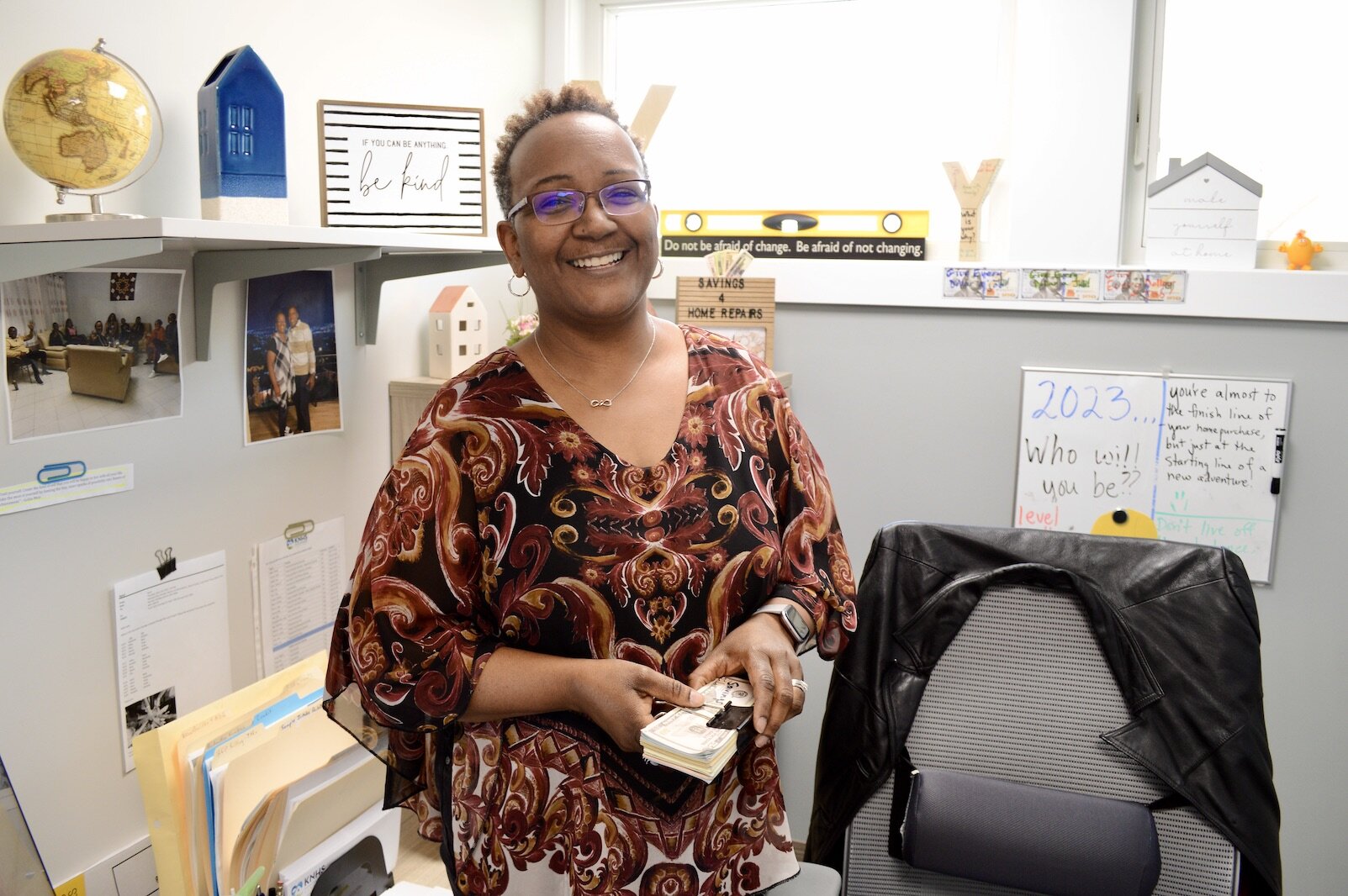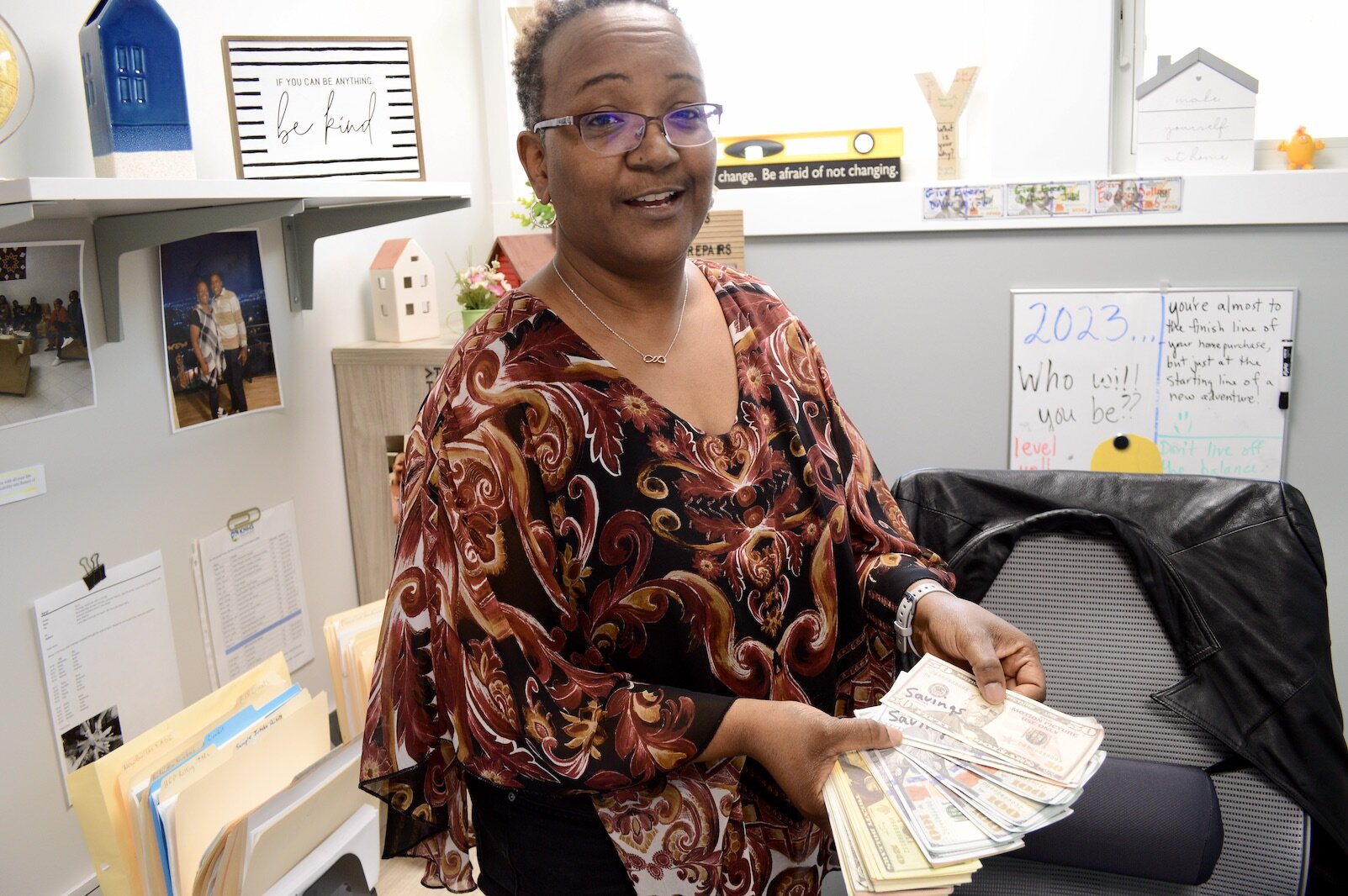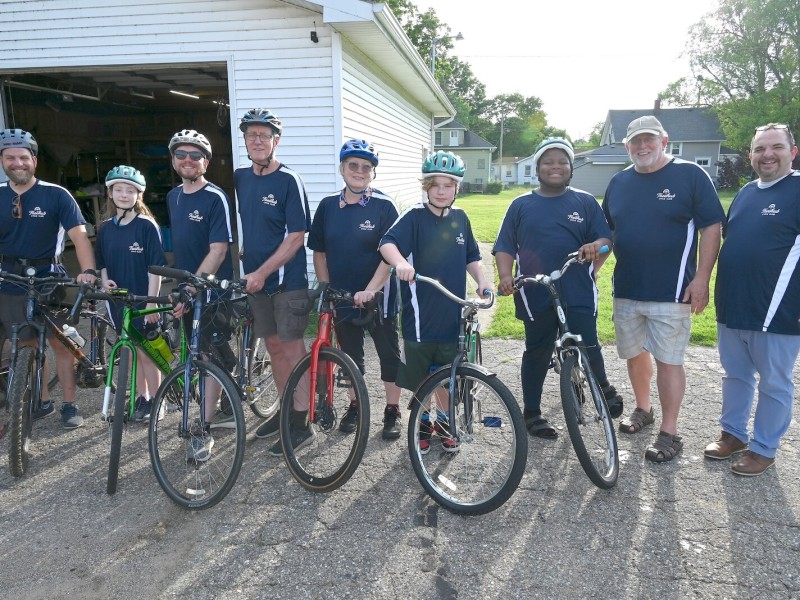Editor’s note: This story is part of Southwest Michigan Second Wave’s series on solutions to affordable housing and housing the unhoused. It is made possible by a coalition of funders including the City of Kalamazoo, Kalamazoo County, the ENNA Foundation, and LISC.
Sarah and Bashir live in the Northside, in a nice but small apartment. He’s employed. Because of double carpal tunnel surgery, Sarah has medical debt to overcome and is on retirement disability at 53.
“We decided we’re tired, we had enough, it was time to get up out of the mud,” Sarah says. Renting “is like throwing money out the window.”
So they’ve gotten on the Pathway Home path to getting their own house. The program, a collaboration of KNHS and Open Doors, helps low-income renters prepare for homeownership.
Sarah hopes they can get a mortgage on a house in six months. Bashir says, “I would give it about a year, just to get a little bit more in our savings to where if we go to the program, they match us on that.”

Where would they like to live?
“Any respectable place Pathway Home wants to put me,” she says with a big laugh. “I would just like to live where it’s peaceful.”
Bashir is thinking Eastwood or Edison. Sarah says, “Just a quiet, respectable neighborhood.”
But before they can buy, they’ve got a bit more saving to do.
Pathway Home has been a big help, they say.
Sarah speaks about the process with the zeal of a motivational speaker. “You have to learn that Every. Dollar. Has. A. Job! And until you learn that, you’re not going to be able to thrive and be able to save. Also, you have to learn what is a necessity and a luxury, and be able to differentiate between the two.”
She continues, “Pathway Homes is phenomenal. They will take you by the hand and teach you and lead you, but you’ve got to be willing to do the work. You have to see the finish line. Because it’s hard work. It is such hard work repairing credit and giving up things and not being able to eat out. You have to be mentally strong and see the finish line.”
Sarah has a saying, she says. “Either you want to stay on the porch with the puppies, or you want to get up here and run with the lions. Whatchu want to do? We’re running with the lions.”
She points to KNHS financial coach Apryl Munyanshongore as helping them get with the lions. “A very phenomenal lady, I’d call her our mentor, she’s fabulous.”
“She gave me something that I live with now, and I tell everybody, this is my credo: When you’re facing all those bills on the table, and you’re in such a state, this is where it begins. Every dollar has a job. Every dollar…. You will begin to realize, damn, I’ve been wasting money here, I’ve been wasting money here,” Sarah says.
They’ve been working with Munyanshongore since fall of 2021. “This is a very slow process. Everybody wants to ziggityboom to the finish line,” she says. There will be setbacks, but “that’s a lesson, baby. Learn that lesson. That L isn’t a loss, it’s a lesson.”
Pathway Home: Encouraging homeownership in Kalamazoo
Pathway Home Manager Matt Ray says it’s a program “for first-time homeowners who have historically been underserved, for folks who are low-to-moderate income, who need education, who need individualized personal coaching, people who on their own without any guidance would likely not become homeowners.”
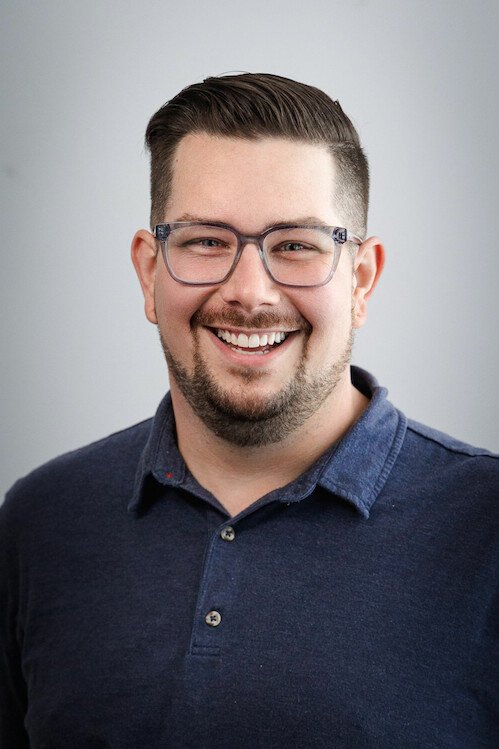
To be eligible, individuals or families must be under 80% of the area median income (or $61,900 for a family of four), want to purchase a home within Kalamazoo County, and have an interest in purchasing in the core Kalamazoo neighborhoods.
They talk with potential homeowners about their goals, get them enrolled in KNHS financial readiness and homebuyer’s education courses, team them with HUD-certified coaches at KNHS, teach them “all the basics on what it means to go from a renter to a homeowner,” Ray says.
By taking the courses, clients become eligible to receive down payment assistance from MSHDA. A grant from the Kalamazoo Foundation for Excellence fuels a match-savings program, to incentivize saving “so folks have cash-in-hand at the time of closing,” Ray says.
“We try to get people into a healthy financial spot,” he says. “Our program is focused on folks who need a personal touch, someone to walk along side them on that journey. Not to just tell them what to do, but to help them make an action plan to help follow-through on those steps.”
Help during the housing crisis
Ray came to Open Doors in June, 2021. “I was called in to build the program — the vision was cast previously for the program, between Open Doors and KNHS.” His mission was “to take the vision, and put it into action.”
He came from outside of Kalamazoo, from a ministry background, with an education in community human services. “Kalamazoo is home now, I’m raising my family here and going to school here.”
Having looked closely at the housing situation in Kalamazoo, “my impression is that there are not enough housing units for the amount of people we have living here.”
There are not enough affordable units, “and we have corporations, small landlords and large landlords who are taking advantage of people, providing crummy housing for astronomical prices,” he says.
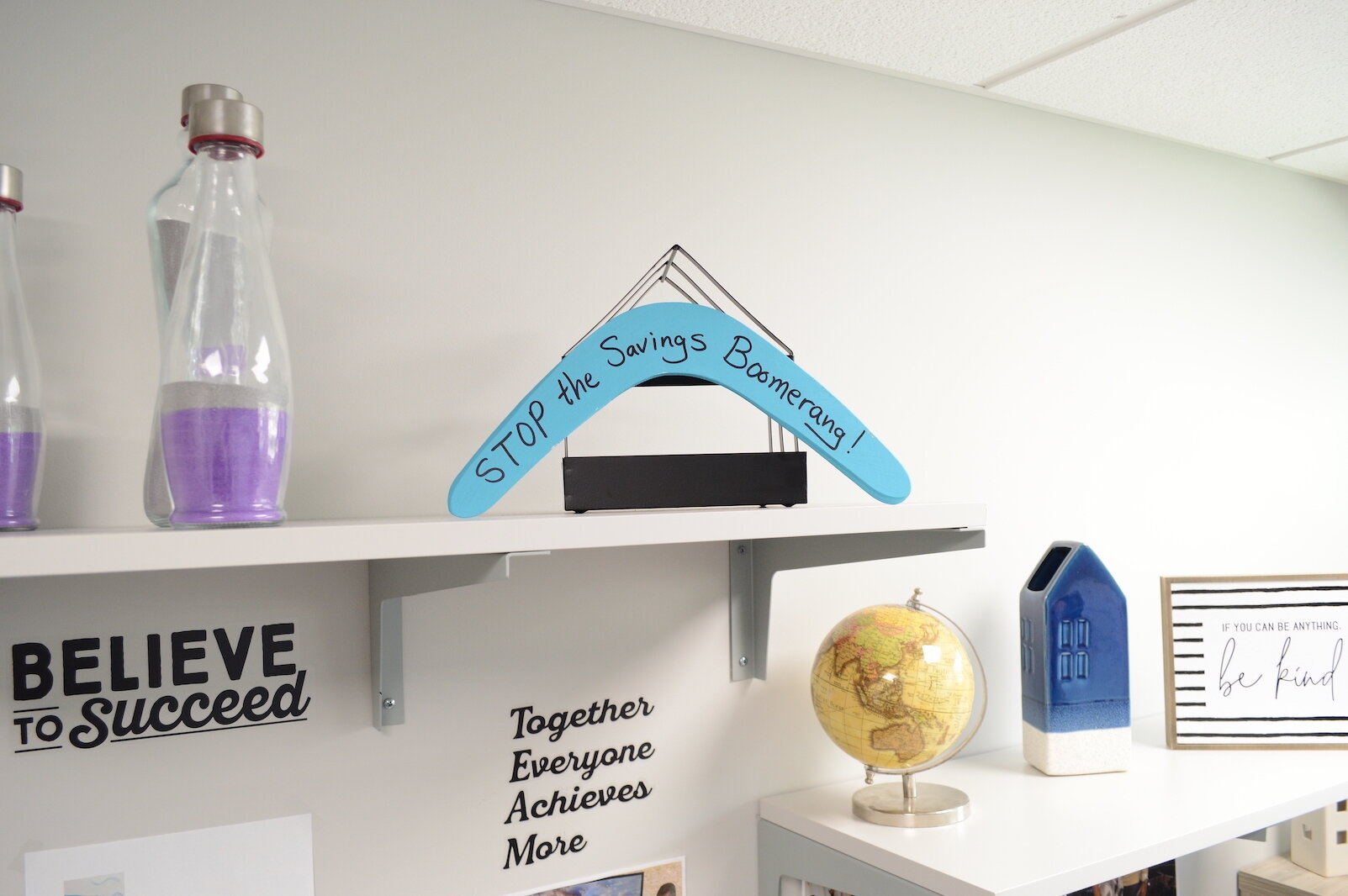
“I have a lot of families calling who’ve been evicted because their rent has gone up or they’ve been asked to leave because properties have been sold.”
Because of Kalamazoo’s housing crisis, “we’re totally booked and have a waiting list, and don’t have the resources to serve the community members in need.”
Ray pulls up the Pathway Home year end report of 2022. As of Jan. 1, they have 24 households active in the program, 56 individuals, 28 of those are children. All the clients come from the core neighborhoods, 22 are BIPOC.
Ten “have had a significant increase in their credit scores, so that’s one thing we’re really happy for,” he says.

Credit scores have jumped for those clients from 14 to 94 points. Four out of the 24 “have had a really giant increase in their savings since enrolling in the program,” increases from $1,500 to $4,000.
But it can be slow-going on the road to buying a home. Especially if what’s needed has to be affordable and also safe.
Pathway Home has one family in a lease-to-own Open Doors property, who’re about to be the first homeowners of the program. They are set to close on the Open Doors house in May.
We asked Ray about the lawsuit aimed at Open Doors, the City of Kalamazoo and a property manager, filed by a family claiming lead poisoning from the house they rented from Open Doors.
“We’re in an odd place,” he says. Open Doors had yet to be served (as of the date of the interview).
He added, “Pathway Home is not just a program of Open Doors. It’s a community program between two organizations, Open Doors Kalamazoo and KNHS.”

Does that situation hint at a larger problem, that affordable houses in Kalamazoo are often old, need renovations, and can come with health hazards?
There is an effort to get Pathway Homes clients into houses renovated by KNHS and their construction team, made into “safe affordable houses for folks,” Ray says. Seven KNHS houses should be ready this summer. Lease-to-purchase arrangements should be available for Pathway Homes clients.
But some people are going to want a wider-range of choices when buying their home. “There are going to be times where folks, because of their choices, are going to just buy from the market. And our goal is to get them mortgage ready, and walk them through that process,” he says
“It is going to be difficult. We have some folks who feel that they can pull the trigger at any time, but when purchasing from the market, the homes in their price range are not to their liking or in the condition they’d need it to be to move in their family. A bit of a problem we’re having.”
‘You’re giving every dollar a job’
There’s a glaring distraction in financial coach Apryl Munyanshongore’s office.
A nice neat fan of $100 bills is displayed on her desk. The budget of the KNHS homeownership department can afford such fat stacks of cash, just laying out?
“Actually,” she says, and pulls out a larger stack from a drawer, “it’s prop money. You can just get it on Amazon.” The actual worth of all the realistic bills in her office is about $25.
“Those aren’t real — no way, no!” she says, laughing.
They are teaching tools to help Munyanshongore’s clients get a grip on their finances. As a homeownership coach, she helps people focus on their own dollars, and how it’s possible to save, to pay off debt, and to eventually prove to a bank that they can take on a mortgage.
People don’t deal with actual cash anymore. “If you’re just swiping a card, you don’t really feel the pain,” she says. “Let’s say someone is doing their budgeting, we just say, Okay, maybe you have $600 for rent, so let’s actually count it out….”
Six $100 bills fly away, another few leave the stack for bills, food, etc, and then that important $50 for savings goes into its special place.
“You’re giving every dollar a job,” is what she tells clients.
Back in their apartment, Sarah and Bashir say they want to own their home not only so they can stop throwing money out of the window as rent, but to also build some generational wealth they can leave to their children.
Some people have come from generations of renters, and have never inherited the investment that parents and grandparents put into homeownership, Munyanshongore says. That leads to a fixed mindset, an assumption that any other way is just not for them.
“I look at it as, you have internal issues, and external issues. The internal issues are having a fixed mindset versus having a growth mindset,” Munyanshongore says.
They’re stuck thinking “this is how my parents always did it, my grandparents always did it, so this must be the way, renting must be the way.”
A growth mindset leads one to realize they need to study the homeownership process, learn how to get their finances in order, perhaps to talk to someone at KNHS, she suggests. Clients need to “get those ideas” showing that homeownership is possible for them.
The first step in getting those ideas is learning, in KNHS’s classes and through coaching, that they can gain control of their money, she says. One has to realize, “who’s in charge of your money,” and then work at “reducing your debts by 50% over six months. If you set up a plan, it’s possible that your credit score can increase in two to three months, if you’re paying attention.”
Clients need to break the paycheck-to-paycheck cycle “by creating a spending plan, which is a budget. Stopping the boomerang effect with savings” — she points to a boomerang in her office. Money put in savings can tend to boomerang back out. “We talk about how you can put it in there and keep it in there.”
In a world tempting us to spend our money, she helps get people excited about saving. It’s about “stacking the cash, finding fun hacks to save money,” and seeing saving as “spending money on your future self.”
Clients are taught to develop a budget, save money, deal with their credit score — many clients have a low score not because they’ve fallen in debt, but because they’ve never had a credit card, haven’t had a car payment, she points out — “And then plan. That’s the biggest thing. It has to be something that’s written, it’s done monthly, at the beginning of the month, and then you’re tracking it throughout the month.”
One huge issue for their clients is, they arrive wanting to be homeowners but have no idea where to start. Pathway Home and KNHS can help by “just walking alongside our clients. If they have any hurtles they have to jump over, any mountains they have to climb, any forks in the road they have to decide, we’re walking with them,” Munyanshongore says. “We can be there for them.”
Photos by Mark Wedel.


